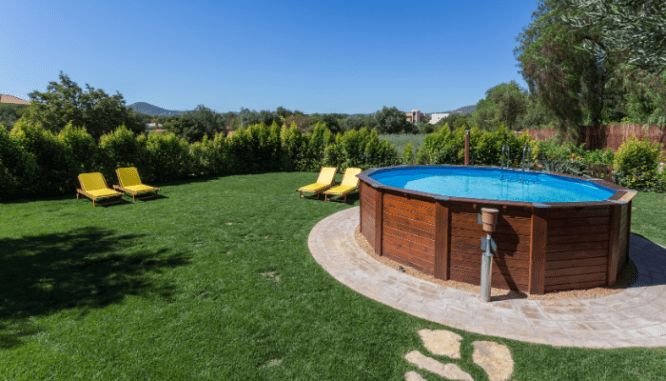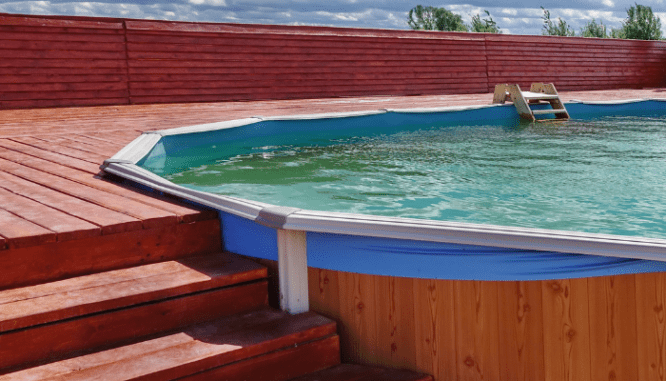Does an Above-Ground Pool Increase Home Value? Think Memories Over Money
- Published on
- 5 min read
-
 Melissa Rudy Contributing AuthorClose
Melissa Rudy Contributing AuthorClose Melissa Rudy Contributing Author
Melissa Rudy Contributing AuthorMelissa Rudy is a seasoned digital journalist with 15 years of experience writing web copy, blog posts and articles for a broad range of companies. When she can’t buy or sell homes, she settles for the next-best thing: researching and writing about all things real estate-related.
Does an above-ground pool increase home value? As public pools and country clubs shut down across the country in 2020, Americans didn’t care. Desperate to recreate a cool and refreshing summer activity at home, above-ground pools cropped up in backyards across the country.
At Only Alpha Pool Products in Indiana, CEO Thomas Epple told Reuters that orders for its steel and composite walls for above-ground pools skyrocketed by 200% in a matter of two months. Meanwhile, Google searches for “above-ground pools” reached peak popularity of “100” in late May. Above-ground pools in particular hit the sweet spot between the $40 inflatable kiddie pools from Amazon and spending $28,000 to $55,000 on an inground pool, fueling their popularity for homeowners who needed a quick fix.
It’s yet to be seen whether those who installed above-ground pools during the coronavirus pandemic will extract any value out of their purchase. Above-ground pools tend to lack the sophistication and upscale design of their underground counterparts, but they also could appeal to families appreciative of the amenity.
Curious to dig in further, we asked certified residential appraisers and real estate agents who regularly sell homes with swimming pools to weigh in on the cost vs. value of the above-ground swimmer’s paradise.

Typical cost of an above-ground pool
As with most home improvements, the cost of an above-ground pool will vary depending on factors like brand, materials, yard prep, and added enhancements. According to HomeAdvisor’s collection of cost surveys, it costs between $734 and $4,609 to buy and install an above-ground pool, with the average cost hovering around $2,569.
River Pools & Spas, a Warsaw, VA, pool manufacturer and installer since 2001, puts that estimate a little higher — at a range of $4,000 to $12,000, not including a pool deck. The company estimates that above-ground pools will last you 7 to 15 years.
Michael Dean, a registered pool and spa contractor in Winter Haven, Florida, has more than 25 years of experience designing and building custom pools. He also runs the Pool Research website to help homeowners and pool builders get the information they need to make informed decisions. According to Dean, there are several factors influencing the overall cost of an above-ground pool:
Material:
Most above-ground pools are made of steel, aluminum, or resin. The resin pools have the advantage of being rust-proof and highly resistant to warping and denting. As they are more expensive than the other materials, resin pools have the potential to hold more value.
Insurance:
According to Zack’s Investment Research, an independent research company that has provided financial data to investors since 1978, most insurance companies recommend boosting your homeowners insurance liability coverage to $500,000 (five times the standard amount) when a pool is on the property.
Depending on where you live, this could mean up to $75 tacked onto your premium. However, as above-ground pools are considered personal property, there may be limits on how much coverage you can have on the pool — typically 50%-75% of the total coverage on your home. That means if you have $300,000 of dwelling coverage, you would have up to $150,000 on your above-ground pool and surrounding structures.
Pool maintenance:
Dean’s Pool Research site estimates that DIY pool owners can usually take care of all of the chemicals and cleanings for around $200 each year, but hiring a professional pool cleaner can cost up to $150 per service.
Landscaping:
Many homeowners add landscaping around an above-ground pool to make it blend more seamlessly with the yard and house. General recommendations are to set aside at least $1,500 for landscaping around an above-ground pool, but costs can easily exceed that amount for more upscale installations.
Permits:
Each city will vary, but most homeowners can expect to spend anywhere from $150 to $300 to obtain a permit to install an above-ground pool.
Electrical work:
It generally costs anywhere from $350 to $1,500 for the initial electrical work to get your above-ground pool up and running, and then an additional $30 to $250 per month on your electric bill. If you choose to add lighting and/or a heater, that will further drive up the electrical costs.

How do appraisers value an above-ground pool?
Assessing the value of an above-ground pool isn’t as straightforward as assigning a certain dollar figure. Appraisers will have different outlooks on how to determine whether the pool will boost the home’s price — or even detract from it.
Personal property or permanent structure?
Most appraisers won’t consider an above-ground pool to be part of the property if the pool can be removed and isn’t incorporated into the house. In that case, the appraiser views the above-ground pool similar to, say, a trampoline in the yard. However, Limbird says that if the above-ground pool is written into the contract to be conveyed with the house, it will be included in the appraisal.
Edward Bedinotti, a certified residential appraiser in New York State, agrees that an above-ground pool won’t add value to a property because personal property items are not typically valued in a home appraisal. However, there are times when a well-designed, well-integrated above-ground pool could add value.
Quality matters
“The biggest distinguishing factor is if an above-ground swimming pool is at least partially built below ground, in which case an appraiser might consider the pool to be part of the physical real estate,” Bedinotti explains. “Ultimately, the decision is a subjective one that is left up to the individual appraiser.”
Dean echoes: “Higher-end pools that are designed to serve as an extension of the home are much more likely to be taken into account during an appraisal, especially if they have drainage and pipes that run underground.”
Location makes a difference
Above-ground pools generally add more value in areas that have warm temperatures year-round, such as Florida, Texas, or Arizona, as there will naturally be more demand for them. Otherwise, many buyers will be unwilling to sacrifice their valuable yard space for a nonessential amenity that will only be used a few months of the year.
Limbird primarily sees above-ground pools in older neighborhoods and rural settings.“In many of the higher-price-point neighborhoods, the homeowners’ associations don’t allow them,” she says.
You’re investing in your own enjoyment
While some pools add more value than others, most appraisers agree that the addition of an above-ground pool should be based on the homeowner’s personal enjoyment rather than a means of driving up the home’s price. According to HouseLogic, even a pool that checks all the “smart investment” boxes would still only bring a maximum 7% increase in value.
The key takeaway, according to Limbird: “Some buyers will see an above-ground pool as a great addition, but others will want it to be removed.” In cases where the pool doesn’t have a deck — or has not been well-maintained and is more of an eyesore than an amenity — she suggests that the seller offer to leave it, but be willing to remove it at the buyer’s request.

Tips to boost the value of your above-ground pool
While an above-ground pool won’t be a means of netting a ton of profit, you can take steps to make it more attractive to buyers and turn it into a selling point.
Keep it comparable
When you add an above-ground pool, aim for the sweet spot of creating outdoor space that complements your home and appeals to buyers, without spending so much that the addition far exceeds the rest of the neighborhood. If the pool is in line with the surrounding homes, you’ll be more likely to recoup the costs when you sell. For example, if all of the houses with above-ground pools on your street have simple, basic decking, it might be overkill to spend thousands of dollars to build a stone wall and deck with a built-in adjacent hot tub.
Add an attractive and functional pool deck
Nothing screams “impermanence” like an above-ground pool plunked in the middle of a backyard. When advising homeowners on how to make an above-ground pool more valuable, Dean tells them to incorporate it into an outdoor living space that is a seamless extension of the home. A pool deck is the most effective way to achieve this. The deck can be built to allow easy accessibility to the pool from the home.
Limbird currently has a listing with a higher-end above-ground pool where the homeowner has dug out a portion of the ground so that the pool is partially inground, which gives it more of a permanent, custom look.
Play up the pool with landscaping
Invest in attractive landscaping around the pool to increase its value. Depending on your budget and timeline, you can make any of the following investments to improve the sophistication of your above-ground pool:
- Add some gravel or rock around the perimeter of the pool, like these Rainforest Beach Landscaping Rocks.
- Build a concrete or paver patio for a more custom, permanent look.
- Plant trees or shrubs around the pool for added privacy.
- Place some decorative planters around the pool to add seasonal color and warmth.
Add a fence for safety
Particularly in neighborhoods with children, it’s essential to surround the pool with a secure fence and locking gate, like this one from Amazon for less than $1,000, to prevent accidental drownings. This will help to assure buyers not only that their own family will be protected, but also that they won’t have to worry about being liable for other children accessing the pool.
Buyers could love or hate your above-ground pool
An above-ground pool won’t be the easiest or most straightforward way to increase home value. A lot also hinges on the individual buyer who ends up purchasing your home: Someone who has always wanted a pool might see it as adding value, while parents of young children could perceive it as a safety hazard and prefer extra yard space instead. And if a buyer knows they have to remove the pool after the sale, they could come in with a lower offer price to cover the cost of removal.
“Whether it’s an inground or an above-ground pool, the seller typically doesn’t get back the expense dollar for dollar,” says Limbird. “I usually tell the seller to think of that cost as an investment in the time and enjoyment they had with the pool — they might not get the money back, but they’ll have the memories.”
*When you buy something using the retail links in our articles, we may earn a small commission. Thanks!
Header Image Source: (Anna Demianenko / Unsplash)
